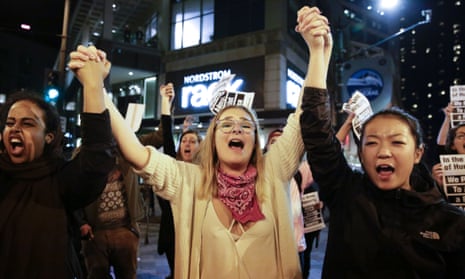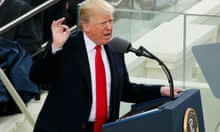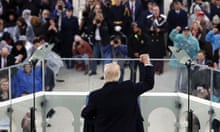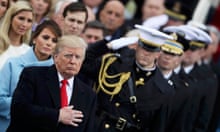The Women’s March on Washington will take place at 10am Saturday – the day after Donald Trump is officially sworn into office. More than 200,000 people are expected to attend, with participants traveling across the country.
Logistics can be tricky for any such large event, so if you’re planning to attend, here are some suggestions for what to bring and what you need to know:
What to bring
Posters or flags: both will be allowed, but flags cannot have poles and posters cannot have wooden sign posts, according to the march FAQ. If you’re making your own sign, guides like this one from i-D recommend using foam core instead of poster board. The Amplifier Foundation has chosen a selection of five posters that you can print and bring with you. A number will be distributed for free.
A small bag or clear backpack: be warned, there are size restrictions and bags may be subject to search. Transparent backpacks can be no larger than 17in by 12in by 6in, and small bags, purses or totes cannot exceed 8in by 6in by 4in.
Food: every participant is allowed to have one 12in by 12in by 6in plastic or gallon bag for meals. The FAQ also mentions food trucks, and DC of course has plenty of restaurants.
Your phone: for all your photography needs, live tweeting and, most importantly, keeping in contact with those with whom you travelled. A portable battery charger may not be a bad idea either.
A breast pump, if you need it: there are plans for lactation areas, though more information will be updated later on, the FAQ reads.
Other necessities: wallet, water, tissues, medications, bandages, sunscreen, snacks, hand sanitizer, sunglasses, hand warmers, a camera, and anything else you may need for a day outside.
Other people: the march “is for any person, regardless of gender or gender identity, who believes women’s rights are human rights”, according to the official website, which notes that “the decision to bring your children is a personal one”. The site also has information on accessibility for those with disabilities.
What not to bring
The FAQ says not to bring “anything that can be construed” – by law enforcement – “as a weapon”. The DC government has also compiled a list of security restrictions for public events during inauguration week.
What to wear
Warm clothing or layers: DC can get cold in the winter, so you’ll want to bring a hat, gloves or mittens, scarves and a coat. The Washington Post reports however that Saturday could be warmer than usual for the time of the year, with rain a possibility.
Comfortable shoes: you’ll probably be doing a lot of standing or walking, plus you’ll want warm, dry feet no matter the weather. The March begins at 10am and while details of the route have not yet been publicized, it could last until 5pm, according to the New York Times.
Clothing with pockets: with limitations on bag sizes, it may be easier to stow necessities in jacket or pant pockets.
Coordinated clothing: organizers haven’t specified a color to wear to unify the group, but you’re welcome to plan something with your group.
A pink Pussyhat: the Pussyhat Project hopes to outfit marchers with handmade, cat-eared hats in all shades of pink to create a “unique collective visual statement”, according to their site.
How to stay safe
Know the city: Monica Hopkins-Maxwell, executive director of the American Civil Liberties Union of the District of Columbia, emphasized that attendees should make a plan ahead of time when going to any demonstration. That includes having meeting points in case you get disconnected from your group and understanding the basic layout of the city.
A website established by local DC government advises on street closures and getting around during the chaos of inauguration weekend.
Know what safety means to you: Hopkins-Maxwell recommends knowing what feels safe to you. “Safety is along a spectrum, right?” she asks. “What are you willing to engage in? What are you not willing to engage in?”
Know your rights: The ACLU will pass out pamphlets about knowing your rights when demonstrating in DC, compiled with Black Lives Matter DC, Law4BlackLives-DC and a number of other groups. Hopkins-Maxwell highlighted a few tips for interacting with police officers, including memorizing their badge numbers, which should be in plain view, specifying that you would like to remain silent, and knowing that you can ask if you are free to leave.
Know when not to engage: Should counter-protests occur, Hopkins-Maxwell recommended not engaging. If you are concerned about surveillance, she recommended using FaceTime or an app like Signal for communication, or using a temporary phone.
Though such precautions are an important step, Hopkins-Maxwell said she was not expecting any incidents. “In safety planning, you arm yourself with knowledge in case you need to use it and hope you don’t have to,” she said.
The website for the Women’s March said organizers are not expecting any arrests. The protest is permitted and city agencies have been involved in planning. A private security firm has been hired, trained marshals will be there to help and there will be legal observers too.










